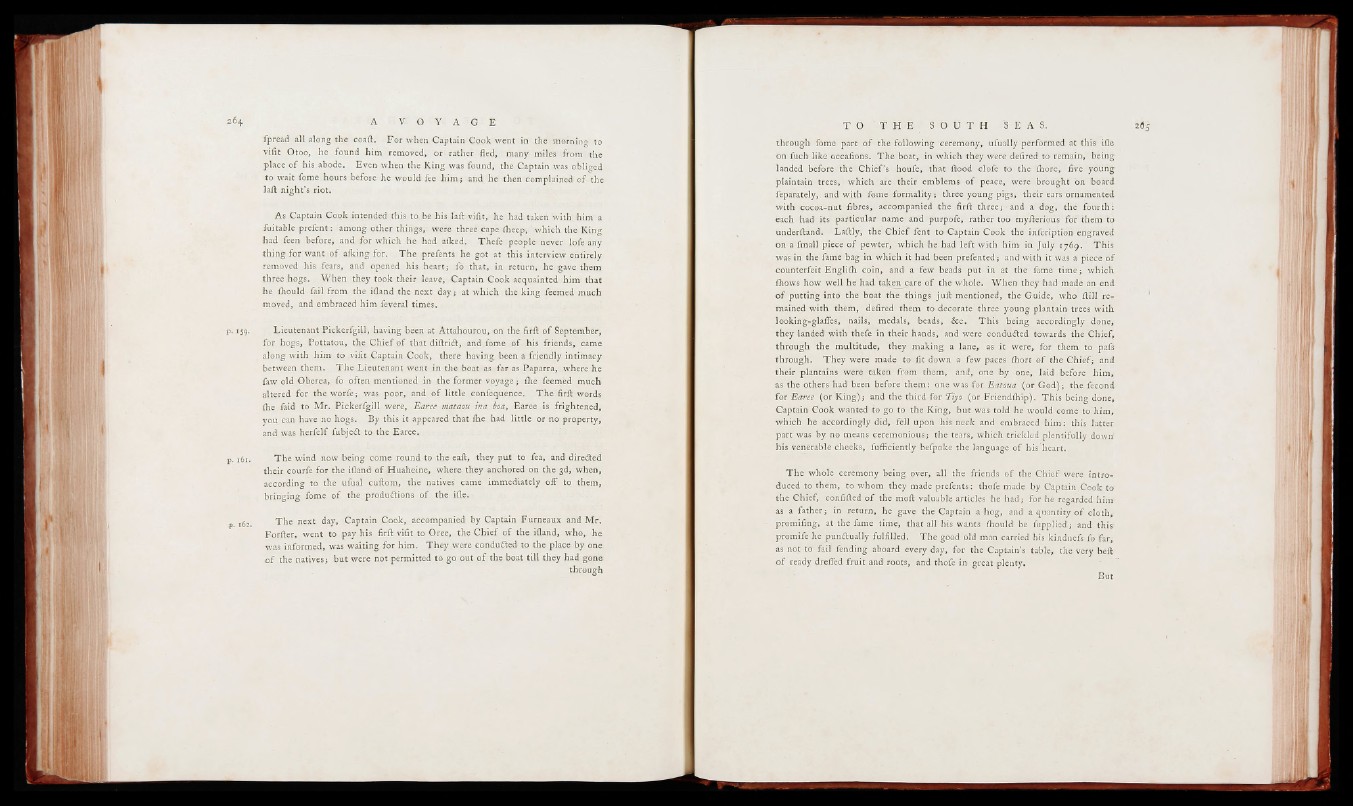
fpread all along the coaft. For when Captain Cook went in the mornino- to
viiit Otoo, he found him removed, or rather fled, many miles from the
place of his abode. Even when the King was found, the Captain was obliged
to wait fome hours before he would fee him; and he then complained of the
lafi night’s riot.
As Captain Cook intended this to be his fail vifit, he had taken with him a
fuitable prefent: among other things, were three cape iheep, which the King
had feen before, and for which he had aiked. Thefe people never lofe any
thing for want of aiking for. The prefents he got at this interview entirely
removed his fears, and opened his heart; fo that, in return, he gave them
three hogs. When they took their leave, Captain Cook acquainted him that
he fhould fail from the ifland the next day; at which the king feemed much
moyed, and embraced him feveral times.
Lieutenant Pickerfgill, having been at Attahourou, on the firil of September,
for hogs, Pottatou, the Chief of that diftriCt, and fome of his friends, came
along with him to viiit Captain Cook, there having been a friendly intimacy
between them. The Lieutenant went in the boat as far as Paparra, where he
faw old Oberea, fo often mentioned in the former voyage; ihe feemed much
altered for the worfe; was poor, and of little confequence. The firil words
ihe faid to Mr. Pickerfgill were, Earee mataou ina boa, Earee is frightened,
you can have no hogs. By this it appeared that ihe had little or no property,
and was herfelf fubjedt to the Earee.
The wind now being come round to the eail, they put to fea, and diredled
their courfe for the ifland of Huaheine, where they anchored on the 3d, when,
according to the ufual cuftom, the natives came immediately off to them,
bringing fome of the productions of the ifle.
The next day, Captain Cook, accompanied by Captain Furneaux and Mr.
Foriler, went to pay his firil vifit to Oree, the Chief of the ifland, who, he
was informed, was waiting for him. They were conducted to the place by one
o f the natives; but were not permitted to go out of the boat till they had gone
through
through fome part of the following ceremony, ufually performed at this ifle
on fuch like occafions. The boat, in which they were defired to remain, being
landed before the Chief’s houfe, that flood clofe to the ihore, five young
plaintain trees, which are their emblems of peace, were brought on board
feparately,. and with fome formality; three young pigs, their ears ornamented
with cocoa-nut fibres, accompanied the firft three; and a dog, the fourth:
each had its particular name and purpofe, rather too myfterious for them to
underftand. Laftly, the Chief fent to Captain Cook the inicription engraved
on a fmall piece of pewter, which he.had left with him in July 1769. This
was in the fame bag in which it had been prefented; and' with it was a piece of
counterfeit Englifh coin, and a few beads put in at the fame time; which
Ihows how well he had taken care of the whole. When they had made an end
of putting into the boat the things juft mentioned, the Guide, who flill remained
with them, defired them to decorate three young plantain trees with
looking-glafles, nails, medals, beads, &c. This being accordingly done,
they landed with thefe in their hands, and were conducted towards the Chief,
through the multitude, they making a lane, as it were, for them to pafs
through. They were made to fit down a few paces ihort of the Chief; and
their plantains were taken from them, and, one by one, laid before him,
as the others had been before them: one was for Eatoua (or God); the fécond
for Earee (or King); and the third for 'Tiyo (or Friendihip). This being done,
Captain Cook wanted to go to the King, but was told he would come to him,
which he accordingly did, fell upon his neck and embraced him : this latter
part was by no means ceremonious; the tears, which trickled plentifully down
his venerable cheeks, fufficiently befpoke the language of his heart.
The whole ceremony being over, all the friends of the Chief were introduced
to them, to whom they made prefents: thofe made by Captain Cook to
the Chief, confifted of the moil valuable articles he had; for he regarded him
as a father; in return, he gave the Captain a hog, and a quantity of cloth,
promifing, at the fame time, that all his wants fhould be fupplied ; and this
promife he punctually fulfilled. The good old man carried his kindnefs fo far,
as not to fail fending aboard every day, for the Captain’s table, the very beft
o f ready drefled fruit and roots, and thofe in great plenty.
But